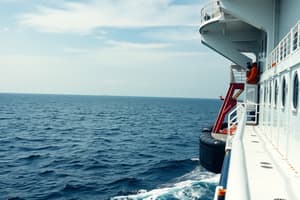Podcast
Questions and Answers
What are some key aspects of career planning skills development for maritime students?
What are some key aspects of career planning skills development for maritime students?
Understanding industry needs and requirements
Why is it important for maritime students to gain knowledge about different ship types?
Why is it important for maritime students to gain knowledge about different ship types?
To understand the roles and specific requirements for each type of vessel in terms of navigation, safety, and maintenance.
What does port operations involve in the maritime sector?
What does port operations involve in the maritime sector?
Managing cargo handling, stowing, and storage within ports.
Why do students studying maritime programs need to evaluate different educational pathways?
Why do students studying maritime programs need to evaluate different educational pathways?
What are some examples of soft skills that maritime students need to enhance?
What are some examples of soft skills that maritime students need to enhance?
Why is technical expertise considered a cornerstone of success in the maritime profession?
Why is technical expertise considered a cornerstone of success in the maritime profession?
How can maritime students build confidence and capability for real-world scenarios?
How can maritime students build confidence and capability for real-world scenarios?
What is the importance of networking in the maritime profession?
What is the importance of networking in the maritime profession?
How can maritime students stay updated on industry trends and developments?
How can maritime students stay updated on industry trends and developments?
What traits do employers look for in potential maritime employees?
What traits do employers look for in potential maritime employees?
Flashcards are hidden until you start studying
Study Notes
Maritime Students Career Planning Skills Development for Seafaring Profession
The maritime industry is vast and diverse, offering numerous opportunities for individuals with the right mix of education, training, and practical experience. For those studying in maritime programs, it's crucial to develop specific career planning skills to ensure they can navigate this dynamic field effectively. Here we will explore some key aspects of these skills and how students can develop them to succeed in their future careers at sea.
Understanding Industry Needs and Requirements
A fundamental part of career planning in the maritime sector involves understanding the current and expected demands of the industry, including:
-
Shipping: This includes container ships, coastal vessels, tankers, bulk carriers, and cruise liners. A good starting point for students would be to gain knowledge on different ship types, their roles, and the specific requirements for each type of vessel in terms of navigation, safety, and maintenance.
-
Port Operations: Port operations involve managing cargo handling, stowing, and storage within ports. Understanding port operations processes such as loading, unloading, and securing cargoes is essential.
-
Educational Pathways: Considering the wide range of job options available to professionals in the maritime sector, students need to evaluate which paths align with their interests and aspirations.
Understanding these aspects helps students identify areas where they may excel or face challenges, allowing them to make informed choices regarding specialization, further study, and professional networking opportunities.
Developing Technical Knowledge and Soft Skills
Technical expertise is a cornerstone of success in the maritime profession. Different areas require various levels of technical competence, from mariners operating equipment like winches and mooring lines or pilots navigating large ships through busy harbors. Maritime students must acquire the necessary technical proficiency in line with industry standards. They also need to enhance soft skills such as communication, teamwork, leadership, adaptability, problem solving, and time management—all critical attributes for any seagoing professional.
Additionally, students need to develop practical skills by participating in hands-on activities during college courses or internships at sea. These experiences help build confidence and capability when faced with real-world scenarios while working aboard commercial vessels.
Networking and Internships
Networking plays a vital role in building connections with fellow students, instructors, alumni, and other maritime professionals. Attending seminars, workshops, conferences, and joining relevant associations is highly recommended. By engaging with peers and mentors, students can obtain valuable insights into industry trends, employer expectations, and employment prospects. Moreover, internships allow students to apply theoretical knowledge gained from studies to real-life situations, enhancing employability upon graduation.
Continuous Learning and Adaptability
Given the rapid pace of technological advancement in the maritime sector, continuous learning is imperative. Stay updated on new regulations, technologies, best practices, etc., by regularly reading trade magazines, attending webinars, and following online platforms dedicated to maritime news and developments. Additionally, being open to change and willingness to learn are crucial traits that employers look for in potential employees.
In conclusion, successful career planning for maritime students requires a deep understanding of industry needs, developing both hard and soft skills needed for the job, active participation in networking events and internships, maintaining a commitment to continuous learning, and demonstrating flexibility and adaptability throughout one’s career journey.
Studying That Suits You
Use AI to generate personalized quizzes and flashcards to suit your learning preferences.




